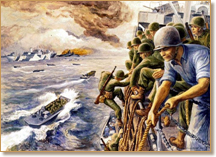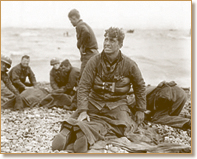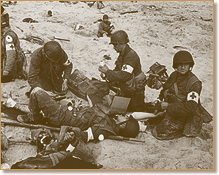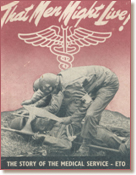|
 |
Richard W. Borden, M.D., interviewed by the Bureau of Medicine and Surgery for a
medical documentary, explained that in 1943, he was a young, innocent USN corpsman transferred directly from
Bainbridge Hospital into the 6th Naval Beach Battalion. Arriving at Camp Bradford, VA, wearing his Navy whites with a
white duffel bag slung over his shoulder, 17-year-old Borden walked into "a filthy, dirty double row of squad tents
- eight-man squad tents - with a little heater stove in the middle with a pipe through the top. And it was raining
and there was so much mud. The mud would splash up on the cuffs of your white pants. Being a corpsman, I went from
the sterility of the hospital into this mud and I opened the tent flap, there wasn't a soul there in that tent.
They were on a weekend leave, so it must have been a Friday afternoon that I got in. My memory is that there were
double-decker bunks painted olive drab. I seem to remember not just rifles and carbines but even tommy guns
hanging on them. Everything was filthy with nobody's bunk made up. There was nobody there. It smelled of nothing
but human sweat and smoke. I'm a nonsmoker and always have been. So I thought to myself, 'Dear Lord, what am I
getting into here?' Everything was khaki, you know. That was my introduction to the amphibious forces!"
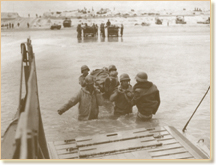 |
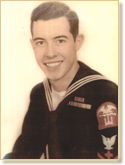 |
Dr. Borden writes in his book We Few, "While the Combatant Beach Boys had carbines, M-1's, '45 Tommy-Guns' and
Colt-45's (Officers); we Corpsmen matched their weight with our Medical Bags! But first, around the waist of our
coveralls was our heavy "Pistol-Belt" with our personal wallet sized medical packet containing medium Battle Dressing,
an aluminum "toothpaste-like" tube with attached needle of Morphine, and khaki packet of sulfa dusting powder. On
the right hip, toward the butt, was my canteen with canteen cup, knife, fork and spoon in its khaki canvas carrying
case. The Corpsmen's "hip" medical pouches were, I believe both belted and hung by a back crossing 'shoulder-strap;'
as they weighed 10-15 lbs.; each containing tourniquet, slings, dressings, pack of surgical instruments, the 50cc
package of serum albumen, short wooden splints, tape, bandage scissors, triangle bandages, morphine - but mostly
medium and large Battle Dressings all khaki, even MEDICAL-TAG-BOOKS!"
Six decades later, Richard Borden and 6th Naval Beach Battalion shipmate John Gallagher returned to Normandy for the
60th anniversary of D-Day, to be named Knight of the Legion of Honor, France's most prestigious award, for their
participation in the liberation of France and Europe.
Reprinted from The News & Observer with permission; Copyright © 2004
By Jerry Allegood and Richard Stradling
June 6, 2004
Richard Borden of Morehead City was a skinny, 18-year-old Navy corpsman when he went ashore at Normandy with the
first wave of troops June 6, 1944.
He was part of the 6th Naval Beach Battalion, a medical unit that splashed ashore at Omaha Beach with Army soldiers.
Wearing a Red Cross armband and serving as a noncombatant did not protect the corpsmen from mortars, mines and
artillery fire. Borden's companion, a stretcher mate named Rick, was killed as the two scrambled across the rocky
shoreline.
There was a lightning-like crack as the two men dived to the ground. Moments later, Borden turned to his partner, 12
feet away, and called for him to move on. When he didn't, Borden rolled him over and had his first face-to-face
encounter with death. "He had a wife and a little girl, Borden recalled. "I said, 'Please, God, let me trade places
with him.'"
Sixty years later, Borden doesn't consider himself a D-Day hero. But he was recognized as one Saturday when he
received the Legion of Honor award from the French government.
Borden, 78, a retired physician, was one of 99 American participants in the battle to liberate France to receive the
honor, the nation's most prestigious military decoration. The plan to honor the veterans was conceived by Jean-David
Levitte, the French ambassador to the United States.
"We are extremely humble, to the point of tears, everywhere we turn around," Borden said in a phone interview from
Paris on Saturday night. "The French are really knocking themselves out to say thank you."
 |
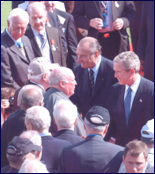 |
| |
Dr. Borden and Army nurse Marcella LeBeau of the
Cheyenne River Sioux Tribe, Promise, SD, after Legion of Honor ceremonies in the courtyard of the Hotel
des Invalides. The following day, Richard Borden meets President George W. Bush after D-Day ceremonies
on Omaha Beach 6 June 2004. Note Medal of Honor recipient Walter Ehlers, WWII hero George McGovern and
President Jacques Chirac in this historical DOD photo.
|
In a ceremony in the courtyard of the Hotel des Invalides, a palace built for those wounded in war, the red ribbon
and five-pointed silver and green star was pinned to Borden's lapel. He said his gray suit was covered with other
ribbons and medals, including a medal of honor given to him by the Daughters of Confederacy during the war. He also
wore his Red Cross armband, still darkened by bloodstains from Normandy.
After more ceremonies today at the beaches of Normandy, Borden, his son Richard "Bo" Borden Jr., 17, daughter Carmen
Borden, 19, and a cousin will travel to Holland to visit the grave of Borden's older brother. Paul Borden Jr. was a
fist lieutenant in the infantry when he was killed in the Battle of the Bulge. Borden, who has not visited the grave
since 1952, said he thought of his brother as he received the Legion of Honor.
Before he left France, Borden spoke about the Bronze Star he received from the Navy for coolness under fire on the
Normandy beach. The way he sees it, he was part of a little-known medical unit doing what it had to.
"I did a good job, but I did what I was trained to do," he said.
While the infantry assaulted German positions on high ground, engineers attempted to clear the beach and establish
supply lines. Medical teams collected casualties, provided first aid and evacuated the wounded.
Sniper and machine-gun fire cut through the air as Borden lay on the beach beside his partner's body. Before that day,
he said, he had never cussed, never uttered "an F or a D." But in his grief and anger, he stood straight up and
screamed at the Germans, "God damn you every one."
Instead of being cut down, Borden said, he was filled with a sense of warmth and peace. He worked nonstop for two
days, caring for the wounded and carrying those on litters to the beach for evacuation to hospital ships. He remembers
begging for blankets and supplies for wounded soldiers. He said he pleaded many times with sailors on landing craft
to take "just one more" casualty back to the ships.
It was more than two weeks before Borden moved off the beach.
He was awarded the Bronze Star in October 1944 for his service June 6 and 7.
"He not only unquestionably saved many lives," his citation reads, "but also gave such an example of coolness and
efficiency to his shipmates that he contributed materially to the success of this phase of operation on his sector of
the beach."
His unit was among those who received the French Croix de Guerre, or War Cross, a military award for bravery in
action. Both the Bronze Star and War Cross citations, now faded, hang on the wall of his den.
Borden later served as a pharmacist's mate in the Pacific. After the war, he graduated from UNC-Chapel Hill and
received his medical degree from Duke University in 1953.
For more than 40 years, he specialized in family medicine, first in his hometown of Goldsboro, then in Morehead City,
when he moved in 1968. He retired after cardiac bypass surgery in 1997.
Borden said his memory of the events of 60 years ago remains vivid, but not haunting. "I don't have nightmares at all,"
he said.
He is eager to talk about it now, he said, because the contributions of the medical unit were forgotten.
"We have been unknown for so long," he said. "Now we're opening up." He said recent films that portray D-Day, including "Saving Private Ryan," accurately depict the noise, confusion and horrible human toll of the battle. What those accounts lack, he said, are the smell, the acrid scent of cordite from explosives and the stench of burning bodies.
Despite the carnage, he said, being in the battle was the greatest moment of his life.
He has returned to Normandy twice since the war for reunions or observances. He took along a small vial of sand and a
stone he had taken as a souvenir from Omaha Beach during a visit in 1952.
He wanted to take them back to the beach, he said, because he doesn't expect to return again.
U.S. Navy Memorial in Washington, DC
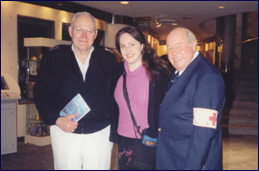 |
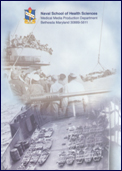 |
| |
| The Surgeon General of the Navy, VADM Richard A. Nelson, MC, USN, Brooke T. Davey, M.D. '06 -
granddaughter of J. Russell Davey, Jr., M.D. - and Richard W. Borden, M.D. at the 21 May 2001 premiere
of Navy Medicine at Normandy. The Surgeon General is holding an autographed book We Few written by Dr.
Borden. |
 Back to Top
Back to Top







